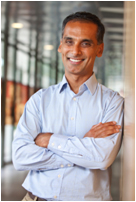Abstract
Differential Privacy is framework for enabling the analysis of privacy-sensitive datasets while ensuring that individual-specific information is not revealed. The concept was developed in a body of work in theoretical computer science starting about a decade ago. It is now flourishing as an area of research, with deep connections to many other topics in theory. At the same time, its potential for addressing pressing privacy problems in a variety of domains has attracted the interest of scholars from many other areas, including statistics, databases, medical informatics, law, social science, computer security and programming languages.
In this talk, I will give a general introduction to differential privacy, and discuss some of the theoretical and practical challenges for future work in this area. I will also describe a large, multidisciplinary research project at Harvard, called "Privacy Tools for Sharing Research Data," in which we are working on some of these challenges as well as others associated with the collection, analysis, and sharing of personal data for research in social science and other fields.
Speaker
 Salil Vadhan is the Vicky Joseph Professor of Computer Science and Applied Mathematics in the Harvard University School of Engineering and Applied Sciences, and the Director of the Harvard Center for Research on Computation and Society. He received his PhD in Applied Mathematics from MIT in 1999, and was an NSF Postdoctoral Fellow at MIT and the Institute for Advanced Study before joining the Harvard faculty in 2001. He is a recipient of a Simons Investigator Award, a Godel Prize, a Guggenheim Fellowship, a Phi Beta Kappa Award for Excellence in Teaching, and the ACM Doctoral Dissertation Award.
Salil Vadhan is the Vicky Joseph Professor of Computer Science and Applied Mathematics in the Harvard University School of Engineering and Applied Sciences, and the Director of the Harvard Center for Research on Computation and Society. He received his PhD in Applied Mathematics from MIT in 1999, and was an NSF Postdoctoral Fellow at MIT and the Institute for Advanced Study before joining the Harvard faculty in 2001. He is a recipient of a Simons Investigator Award, a Godel Prize, a Guggenheim Fellowship, a Phi Beta Kappa Award for Excellence in Teaching, and the ACM Doctoral Dissertation Award.
Vadhan's research area is theoretical computer science, specifically computational complexity, cryptography, and differential privacy. He is the Lead PI on an NSF frontier project "Privacy Tools for Sharing Research Data" (http://privacytools.seas.harvard.edu/). This is a broad, multidisciplinary effort at Harvard to help enable the collection, analysis, and sharing of personal data for research in social science and other fields while providing privacy for the data subjects. Bringing together computer science, social science, statistics, and law, the project seeks to advance our understanding of privacy and data utility, and design an array of technological, legal, and policy tools for dealing with sensitive data.
About the WATCH series:
Transforming today's trusted but untrustworthy cyberinfrastructure into one that can meet society's growing demands requires both technical advances and improved understanding of how people and organizations of many backgrounds perceive, decide to adopt, and actually use technology. WATCH aims to provide thought-provoking talks by innovative thinkers with ideas that illuminate these challenges and provide signposts toward solutions. The series is jointly organized by NSF's Computer Science and Engineering (CISE) and Social, Behavioral, and Economic (SBE) Directorates and sponsored by the CISE Secure and Trustworthy Cyberspace (SaTC) Program. Talks will be recorded and made available over the Internet.
For technical questions during the webcast contact [email protected] or call one of our technical support numbers to the right. |
For the webcast, please tune in 15 minutes prior to the start time for the event and test your video player. This live event will be captioned in compliance with Section 508. The event will be archived for 3 months - viewable at http://www.tvworldwide.com/events/nsf/150115 and http://www.fededtv.com/. Participants should have the Windows Media Player or Flash player installed to view the event. (links to the webcast are in the upper-right corner of this page) |
About NSF
The National Science Foundation (NSF) is an independent federal agency that supports fundamental research and education across all fields of science and engineering. In fiscal year (FY) 2009, its budget is $9.5 billion, which includes $3.0 billion provided through the American Recovery and Reinvestment Act. NSF funds reach all 50 states through grants to over 1,900 universities and institutions. Each year, NSF receives about 44,400 competitive requests for funding, and makes over 11,500 new funding awards.MORE
Founded in 1999, TV Worldwide (www.tvworldwide.com) developed the first Internet TV network of community-based Internet TV channels, primarily targeting niche professional communities ranging from the Maritime industry to the Digital Media sector. Known by many in the industry as "Internet TV for Smart People", Fortune 500 companies, 18 federal government agencies, and numerous International associations including the National Association of Broadcasters, utilize TV Worldwide's live and archived state-of-the art video streaming content applications and Internet TV channels. In recognition of the company's unique achievements in new media, TV Worldwide was selected by the National Academy of Television Arts and Sciences (NATAS) to webcast the Daytime Emmy Awards and the Emmy awards for Technology and Engineering 2007 through 2009. CEO Dave Gardy has been honored by Streaming Media Magazine in 2008 as one of the 25 Most Influential People in Streaming Media. Mr. Gardy also currently serves as the President of the International Webcasting Association (IWA) (www.webcasters.org).